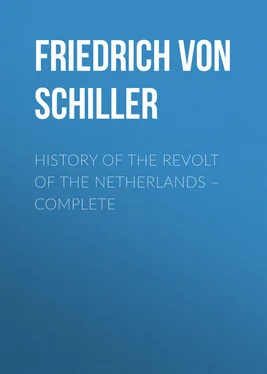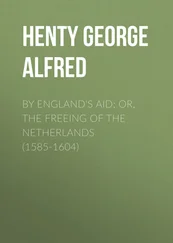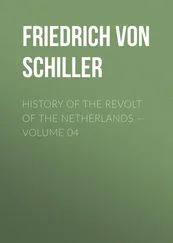Friedrich Schiller - History of the Revolt of the Netherlands – Complete
Здесь есть возможность читать онлайн «Friedrich Schiller - History of the Revolt of the Netherlands – Complete» — ознакомительный отрывок электронной книги совершенно бесплатно, а после прочтения отрывка купить полную версию. В некоторых случаях можно слушать аудио, скачать через торрент в формате fb2 и присутствует краткое содержание. Жанр: История, literature_18, foreign_antique, foreign_prose, на английском языке. Описание произведения, (предисловие) а так же отзывы посетителей доступны на портале библиотеки ЛибКат.
- Название:History of the Revolt of the Netherlands – Complete
- Автор:
- Жанр:
- Год:неизвестен
- ISBN:нет данных
- Рейтинг книги:3 / 5. Голосов: 1
-
Избранное:Добавить в избранное
- Отзывы:
-
Ваша оценка:
- 60
- 1
- 2
- 3
- 4
- 5
History of the Revolt of the Netherlands – Complete: краткое содержание, описание и аннотация
Предлагаем к чтению аннотацию, описание, краткое содержание или предисловие (зависит от того, что написал сам автор книги «History of the Revolt of the Netherlands – Complete»). Если вы не нашли необходимую информацию о книге — напишите в комментариях, мы постараемся отыскать её.
History of the Revolt of the Netherlands – Complete — читать онлайн ознакомительный отрывок
Ниже представлен текст книги, разбитый по страницам. Система сохранения места последней прочитанной страницы, позволяет с удобством читать онлайн бесплатно книгу «History of the Revolt of the Netherlands – Complete», без необходимости каждый раз заново искать на чём Вы остановились. Поставьте закладку, и сможете в любой момент перейти на страницу, на которой закончили чтение.
Интервал:
Закладка:
Through four centuries we find Batavian troops in the Roman armies, but after the time of Honorius their name disappears from history. Presently we discover their island overrun by the Franks, who again lost themselves in the adjoining country of Belgium. The Frieses threw off the yoke of their distant and powerless rulers, and again appearad as a free, and even a conquering people, who governed themselves by their own customs and a remnant of Roman laws, and extended their limits beyond the left bank of the Rhine. Of all the provinces of the Netherlands, Friesland especially had suffered the least from the irruptions of strange tribes and foreign customs, and for centuries retained traces of its original institutions, of its national spirit and manners, which have not, even at the present day, entirely disappeared.
The epoch of the immigration of nations destroyed the original form of most of these tribes; other mixed races arose in their place, with other constitutions. In the general irruption the towns and encampments of the Romans disappeared, and with them the memorials of their wise government, which they had employed the natives to execute. The neglected dikes once more yielded to the violence of the streams and to the encroachments of the ocean. Those wonders of labor, and creations of human skill, the canals, dried up, the rivers changed their course, the continent and the sea confounded their olden limits, and the nature of the soil changed with its inhabitants. So, too, the connection of the two eras seems effaced, and with a new race a new history commences.
The monarchy of the Franks, which arose out of the ruins of Roman Gaul, had, in the sixth and seventh centuries, seized all the provinces of the Netherlands, and planted there the Christian faith. After an obstinate war Charles Martel subdued to the French crown Friesland, the last of all the free provinces, and by his victories paved a way for the gospel. Charlemagne united all these countries, and formed of them one division of the mighty empire which he had constructed out of Germany, France, and Lombardy. As under his descendants this vast dominion was again torn into fragments, so the Netherlands became at times German, at others French, or then again Lotheringian Provinces; and at last we find them under both the names of Friesland and Lower Lotheringia.
With the Franks the feudal system, the offspring of the North, also came into these lands, and here, too, as in all other countries, it degenerated. The more powerful vassals gradually made themselves independent of the crown, and the royal governors usurped the countries they were appointed to govern. But the rebellions vassals could not maintain their usurpations without the aid of their own dependants, whose assistance they were compelled to purchase by new concessions. At the same time the church became powerful through pious usurpations and donations, and its abbey lands and episcopal sees acquired an independent existence. Thus were the Netherlands in the tenth, eleventh, twelfth, and thirteenth centuries split up into several small sovereignties, whose possessors did homage at one time to the German Emperor, at another to the kings of France. By purchase, marriages, legacies, and also by conquest, several of these provinces were often united under one suzerain, and thus in the fifteenth century we see the house of Burgundy in possession of the chief part of the Netherlands. With more or less right Philip the Good, Duke of Burgundy, had united as many as eleven provinces under his authority, and to these his son, Charles the Bold, added two others, acquired by force of arms. Thus imperceptibly a new state arose in Europe, which wanted nothing but the name to be the most flourishing kingdom in this quarter of the globe. These extensive possessions made the Dukes of Burgundy formidable neighbors to France, and tempted the restless spirit of Charles the Bold to devise a scheme of conquest, embracing the whole line of country from the Zuyder Zee and the mouth of the Rhine down to Alsace. The almost inexhaustible resources of this prince justify in some measure this bold project. A formidable army threatened to carry it into execution. Already Switzerland trembled for her liberty; but deceitful fortune abandoned him in three terrible battles, and the infatuated hero was lost in the melee of the living and the dead.
[A page who had seen him fall a few days after the battle conducted the victors to the spot, and saved his remains from an ignominious oblivion. His body was dragged from out of a pool, in which it was fast frozen, naked, and so disfigured with wounds that with great difficulty he was recognized, by the well-known deficiency of some of his teeth, and by remarkably long finger-nails. But that, notwithstanding the marks, there were still incredulous people who doubted his death, and looked for his reappearance, is proved by the missive in which Louis XI. called upon the Burgundian States to return to their allegiance to the Crown of France. “If,” the passage runs, “Duke Charles should still be living, you shall be released from your oath to me.”
Comines, t. iii., Preuves des Memoires, 495, 497.]The sole heiress of Charles the Bold, Maria, at once the richest princess and the unhappy Helen of that time, whose wooing brought misery on her inheritance, was now the centre of attraction to the whole known world. Among her suitors appeared two great princes, King Louis XI. of France, for his son, the young Dauphin, and Maximilian of Austria, son of the Emperor Frederic III. The successful suitor was to become the most powerful prince in Europe; and now, for the first time, this quarter of the globe began to fear for its balance of power. Louis, the more powerful of the two, was ready to back his suit by force of arms; but the people of the Netherlands, who disposed of the hand of their princess, passed by this dreaded neighbor, and decided in favor of Maximilian, whose more remote territories and more limited power seemed less to threaten the liberty of their country. A deceitful, unfortunate policy, which, through a strange dispensation of heaven, only accelerated the melancholy fate which it was intended to prevent.
To Philip the Fair, the son of Maria and Maximilian, a Spanish bride brought as her portion that extensive kingmdom which Ferdinand and Isabella had recently founded; and Charles of Austria, his son, was born lord of the kingdoms of Spain, of the two Sicilies, of the New World, and of the Netherlands. In the latter country the commonalty emancipated themselves much earlier than in other; feudal states, and quickly attained to an independent political existence. The favorable situation of the country on the North Sea and on great navigable rivers early awakened the spirit of commerce, which rapidly peopled the towns, encouraged industry and the arts, attracted foreigners, and diffused prosperity and affluence among them. However contemptuously the warlike policy of those times looked down upon every peaceful and useful occupation, the rulers of the country could not fail altogether to perceive the essential advantages they derived from such pursuits. The increasing population of their territories, the different imposts which they extorted from natives and foreigners under the various titles of tolls, customs, highway rates, escort money, bridge tolls, market fees, escheats, and so forth, were too valuable considerations to allow them to remain indifferent to the sources from which they were derived.. Their own rapacity made them promoters of trade, and, as often happens, barbarism itself rudely nursed it, until at last a healthier policy assumed its place. In the course of time they invited the Lombard merchants to settle among them, and accorded to the towns some valuable privileges and an independent jurisdiction, by which the latter acquired uncommon extraordinary credit and influence. The numerous wars which the counts and dukes carried on with one another, or with their neighbors, made them in some measure dependent on the good-will of the towns, who by their wealth obtained weight and consideration, and for the subsidies which they afforded failed not to extort important privileges in return. These privileges of the commonalties increased as the crusades with their expensive equipment augumented the necessities of the nobles; as a new road to Europe was opened for the productions of the East, and as wide-spreading luxury created new wants to their princes. Thus as early as the eleventh and twelfth centuries we find in these lands a mixed form of governmeut, in which the prerogative of the sovereign is greatly limited by the privileges of the estates; that is to say, of the nobility, the clergy, and the municipalities.
Читать дальшеИнтервал:
Закладка:
Похожие книги на «History of the Revolt of the Netherlands – Complete»
Представляем Вашему вниманию похожие книги на «History of the Revolt of the Netherlands – Complete» списком для выбора. Мы отобрали схожую по названию и смыслу литературу в надежде предоставить читателям больше вариантов отыскать новые, интересные, ещё непрочитанные произведения.
Обсуждение, отзывы о книге «History of the Revolt of the Netherlands – Complete» и просто собственные мнения читателей. Оставьте ваши комментарии, напишите, что Вы думаете о произведении, его смысле или главных героях. Укажите что конкретно понравилось, а что нет, и почему Вы так считаете.












